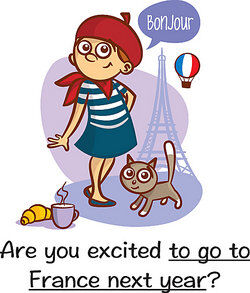
An adjective complement is a phrase that modifies an adjective. It follows the adjective in the sentence and offers more information about it. Adjective complement examples consist of noun clauses or prepositional phrases.
Let's use this as an example. "It was very obvious." Well, what was very obvious? "It was very obvious that Madison wanted to leave." In this example, "…that Madison wanted to leave" is an adjective complement because it further describes the adjective of the sentence, "obvious." (It's also a noun clause.)
Adjective complements are truly that simple. They describe other adjectives. But, for further clarification, let's look at a few examples. We'll sort them according to noun clauses and prepositional phrases.
Adjective Complement Examples
Since adjective complements complete the meaning of an adjective, there are many everyday examples. Let's kick things off with noun clauses.
Noun Clauses
Noun clauses are groups of words that act as a noun. Just like a sentence, they have a subject and a verb. Since they're clauses, they don't form complete sentences. Rather, they're dependent clauses and do not express a complete thought. Noun clauses commonly begin with: who, what, where, when, why, how, that.
These examples will help paint the picture for you:
- It was very obvious that this was the murder weapon.
- I am curious what my surprise will be.
- It is unbelievable that she got accepted at Princeton.
- He was pleased that all his plants in the garden bore fruit.
- Denise is undecided when it comes to choosing music for the party.
- Mom was so happy that they finally got married.
- He was disappointed that she quit the team.
- I am very sad that you are finally moving out of state.
- Anthony was so thankful that he passed the math test.
- I am excited that my friend is coming to town.
- His family was happy when the dog returned home.
- I am worried that the snow storm will be severe.
- She is uncertain whether she made the right decision.
- I must decide which class to take next term.
- The teachers do not know whether or not they can go on the field trip.
- Please let me know who left her purse on the table.
- Everyone knows that he is the best candidate.
Prepositional Phrases
Prepositional phrases consist of a preposition and the object of the preposition, for example, "…in Ireland." Here, "in" is a preposition and "Ireland" is the object of the preposition, or what the preposition is referring to. Common prepositions include: about, at, by, for, in, of, to, with.
Basically, prepositional phrases provide further information about a sentence. But, when dealing with adjective complements, prepositional phrases provide further information about the adjective in a sentence.
Let's take a look at them in action:
- You are amazing in gymnastics.
- Mary is very bright in applied physics.
- He is loving to his pets.
- The company was anxious to sell all of last year's stock.
- I am addicted to ice cream.
- Were you delighted to get the part?
- Geoffrey is afraid of spiders and snakes.
- I am sorry to hear the sad news about your grandfather.
- Zach is eager for his birthday to arrive.
- It was pointless to argue further.
- The coach was hesitant to tell the team about the injury.
- She is likely to be nominated for a Golden Globe.
- The whole town was shocked by the extent of the devastation.
- She was selfish to keep her good fortune to herself.
- Larry is kind to all his employees.
- Are you excited to go to France next year?
- She was startled at the sudden clap of thunder.
- They were hesitant to let their daughter go there alone.
- The award-winning star is difficult to get along with.
- He is interested in designing video games.
- I'm sure I turned the water off before we left.
- It was wrong of him to tell you the secret.
- Lydia was glad to be living on her own.
- I am so happy to hear the news about your promotion.
- The teacher was delighted with her students' progress.
- She was fascinated with the cocoons and butterflies.
- It is illegal to leave a car running in some states.
- We are still optimistic about the future of the planet.
- The employees were surprised to see Golda get the promotion.
- My dog is very sad about me leaving him home alone.
Adjective Complements in Quotes
Adjective complements abound in quotations from famous people, in literature, and in songs.
Here are some examples:
- "I am fascinated by what is beautiful, strong, healthy, what is living." - Leni Riefenstahl
- "America will never be destroyed from the outside. If we falter and lose our freedoms, it will be because we destroyed ourselves." - Abraham Lincoln
- "She was so much surprised that for the moment she quite forgot how to speak good English" - Alice's Adventures in Wonderland, Lewis Carroll
- "I'm always rather nervous about how you talk about women who are active in politics, whether they want to be talked about as women or as politicians." - John F. Kennedy
- "But I still haven't found what I'm looking for." - "I Still Haven't Found What I'm Looking For," U2
- "The eyes shout what the lips fear to say." - William Henry
Using Adjective Complements
In the end, adjective complements are simply a great way to amplify or accentuate an adjective's meaning. You'll always be able to spot them if you can spot the noun clause or the prepositional phrase in a sentence.
Are you ready to explore the kin to the adjective complement? How about a little experiment with Adjective Phrase Examples? While adjective complements amplify adjectives, adjective phrases accentuate nouns. Have some fun building up your adjectival library!